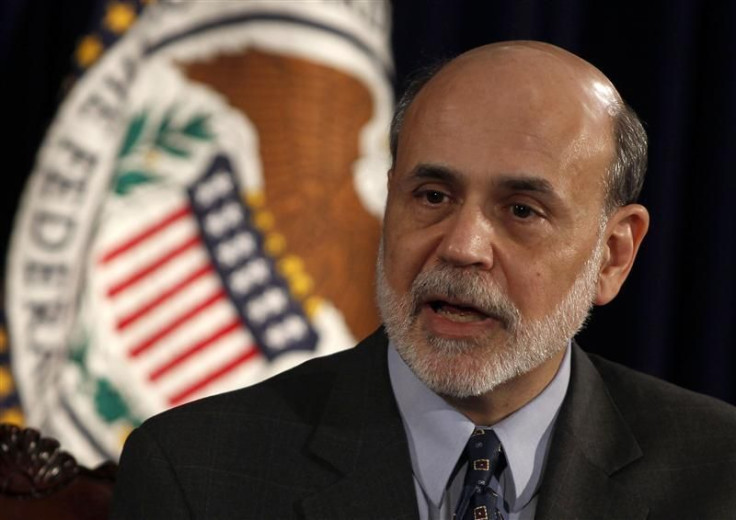Jobs Rebound Dampens QE3 Prospects: Fed Officials

(Reuters) -- The pick-up in jobs has caught the eye of two top Federal Reserve officials who said on Wednesday that continued improvement in the beleaguered labor market dampens prospects for more economic stimulus measures from the central bank.
San Francisco Fed President John Williams and Richmond Fed President Jeffrey Lacker pointed to better-than-expected data in recent months that show the U.S. unemployment rate dropped to 8.3 percent, a still-high level that casts intrigue on the Fed's next move to boost the economy, if any.
The stronger labor market has investors buzzing over whether the Fed will ultimately decide to launch a third round of so-called quantitative easing, or QE3, through more asset purchases.
The central bank may yet need to buy more bonds to bolster the weak recovery, but the jobs data make it a close call, Williams told reporters after a speech in San Ramon, Calif.
Further Fed stimulus is not a slam dunk in the sense that if the economy really slowed or inflation came down a lot - then, I think, the case for more stimulus is much stronger, much more obvious, he said.
Lacker, while noting that unexpected developments could always warrant further stimulus, said: I don't see those prospects as very likely right now at all.
If we keep data like we've been getting, I don't see a rationale for further easing at this point at all, Lacker said on CNN television, after being asked about a third round of quantitative easing.
Williams and Lacker are on opposite sides of an internal Fed debate over how best to nurture an economic recovery from the worst recession in decades. The Fed has kept rates near zero for more than three years and bought $2.3 trillion in Treasuries and mortgage-backed securities to push borrowing costs down further.
While Williams backed a Fed decision on Jan. 25 to state that the central bank expected to keep interest rates exceptionally low through at least late 2014 - a move defended by Chairman Ben Bernanke and the powerful core of policymakers - Lacker was the lone dissenter among those with votes this year on the policy-setting committee.
Lacker, among the minority of hawks who worry more about inflation getting out of hand than the high jobless rate, said rates will need to rise before then and said the positive data in part prompted his dissent.
The economy is picking up steam right now, Lacker said.
Three other Fed policymakers - James Bullard of St. Louis, Charles Plosser of Philadelphia and Richard Fisher of Dallas, all of whom do not have votes this year - have also publicly stated their opposition to the 2014 language in the statement.
INTERNAL DEBATE
While unemployment has dipped, inflation is running below the Fed's 2-percent target, possibly paving the way for more easy monetary policy.
Williams, on the dovish end of the policy spectrum, said he sees the U.S. economy growing at just over 2 percent this year - enough to chip away at high unemployment, however slowly.
That to me is not a satisfactory outcome, he said, but given the recent strength in labor markets, you are kind of in the close-call space with my forecast.
His views appear in line with the majority of the 17 Fed policymakers, including Bernanke, who has said the Fed should consider doing even more for the economy if unemployment stays high and inflation keeps falling.
If conditions worsen enough to merit more bond-buying, Williams said, the Fed should purchase mortgage-backed securities to bolster the distressed housing market, which is at the heart of the weak recovery.
While there are signs of improvement in manufacturing and consumer spending in the world's largest economy, housing has remained depressed.
The Fed is increasingly pinpointing housing as the key to the recovery, and Williams is the second regional Fed president in a week to make the case that any more monetary policy accommodation should come through the purchase of more mortgage-backed securities.
Chicago Fed President Charles Evans last Thursday said he would be aggressive in seeking more help for the economy through the purchase of such bonds.
The Fed's first two rounds of quantitative easing were controversial, drawing criticism at home and abroad.
(Reporting by Ann Saphir in San Ramon and Jonathan Spicer in New York; additional reporting by Leah Schnurr in New York; Editing by Padraic Cassidy)
© Copyright Thomson Reuters 2024. All rights reserved.











